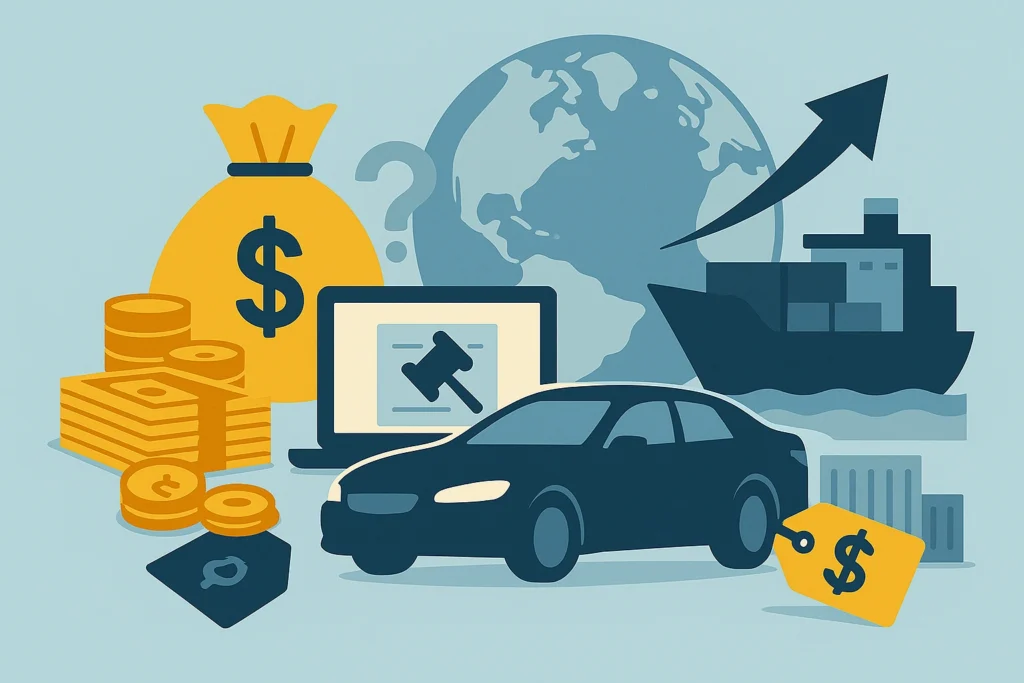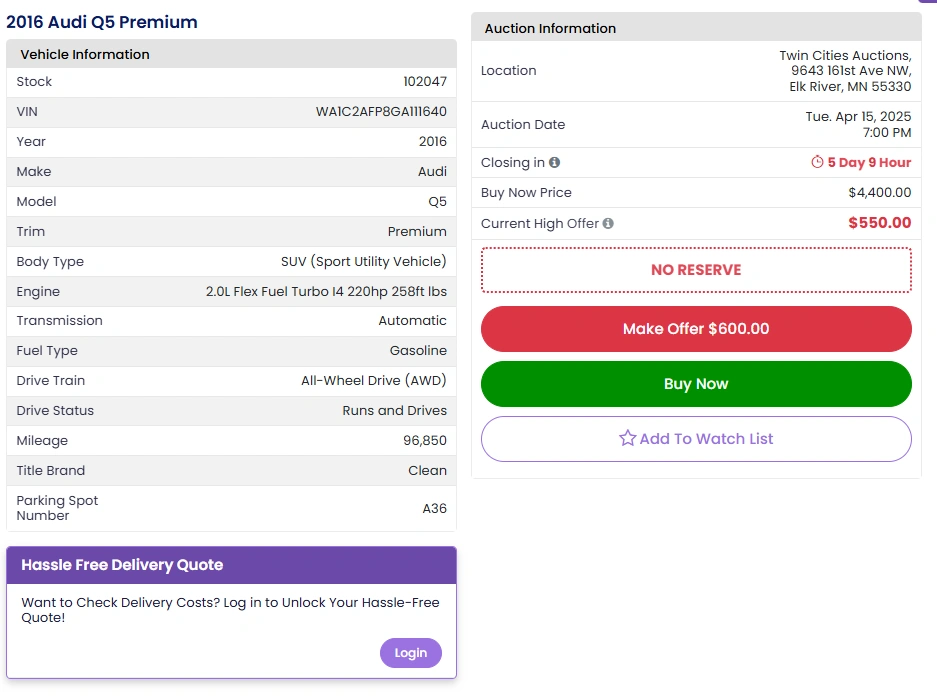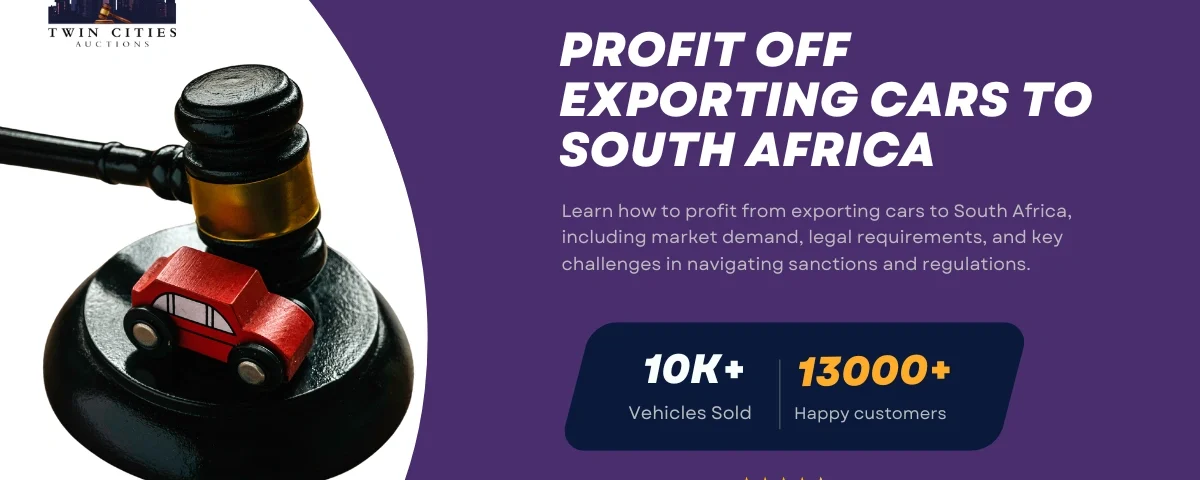Did you know South Africa is one of Africa’s largest automotive import markets? U S exporters who supply compliant, late‑model used vehicles can achieve profit margins of 15–20 percent by focusing on cost control, regulatory compliance, and reliable logistics.
This guide shows you how to calculate landed cost, meet import requirements, and streamline shipping for maximum returns.

Key Takeaways
- Import duty on used passenger vehicles is 25 percent
- VAT adds 15 percent to landed cost
- Profit = landed cost + your margin
- Main ports: Durban and Cape Town
- Required docs: commercial invoice, bill of lading, import permit, certificate of roadworthiness
- Source vehicles from US auto auctions
Understanding the South African Market
South Africa relies heavily on used‑vehicle imports to meet consumer demand for affordable, late‑model cars. Urban drivers favor compact SUVs and sedans for fuel efficiency, while commercial and rural users choose pickups and light commercial vehicles.
Regulations and Compliance
South Africa enforces strict regulations on the importation of used vehicles to protect its local automotive industry and ensure road safety. Import permits for used or second-hand motor vehicles are generally not issued for commercial or resale purposes.
Permits are typically granted under specific circumstances, such as for returning residents or immigrants with permanent residence status.
Additionally, all imported vehicles must comply with South Africa’s safety and environmental standards, which include obtaining a Letter of Authority (LOA) from the National Regulator for Compulsory Specifications (NRCS) and passing a roadworthiness test.
The roadworthiness test assesses various aspects of the vehicle, including emissions, braking efficiency, and safety features like airbags and ABS.
| Document | Purpose | Required For |
| Commercial Invoice | Declares sale value | All imports |
| Bill of Lading | Proof of maritime shipment | Sea‑borne imports |
| Import Permit | Government authorization | All vehicle imports |
| Certificate of Roadworthiness | Verifies safety & emissions compliance | All imported vehicles |
Source: International Trade Administration Commission of South Africa
Building Your Landed‑Cost & Profit Model
Calculate landed cost using these fixed rates:
| Cost Item | Rate | Calculation Example (USD) |
| CIF Cost | — | 12 000 |
| Import Duty | 25 percent | 3 000 |
| Value Added Tax | 15 percent | (12 000 + 3 000) × 0.15 = 2 250 |
| Port & Handling | Varies | e.g., 4 percent × 12 000 = 480 USD |
| Total Landed | — | 17 730 |
Source: South African Revenue Service
Add your target profit margin (for example, 20 percent) on top of the landed cost.
Logistics and Shipping Routes
Selecting the optimal shipping route and port of entry is crucial for efficient vehicle importation into South Africa. Common ports include Durban, Cape Town, and Port Elizabeth, each offering different transit times and handling capacities.
For example, shipping from the U.S. East Coast to Durban typically takes around 20 days, while routes from the U.S. Gulf Coast to Cape Town may take approximately 18 days.
It’s advisable to consult with logistics providers to determine the most cost-effective and timely shipping options based on the origin of the vehicle and the intended destination within South Africa.
| Route | Typical Transit Time | Notes |
| U S East Coast → Durban | ~20 days | Regular container sailings |
| U S Gulf Coast → Cape Town | ~18 days | Breakbulk options available |
| U S West Coast → Durban | ~25 days | Longer sea leg via Atlantic route |
Source: Bolloré Logistics
Financing & Payment Security
When engaging in international vehicle trade, securing payment is a critical consideration. Common payment instruments include Letters of Credit, which offer low risk and are suitable for transactions with new partners or large volume orders.
Open Account terms, which carry higher risk and are typically reserved for established, trusted buyers. Escrow services, which provide a medium risk level by holding funds until the buyer confirms receipt of the vehicle.
Additionally, to mitigate currency fluctuations between the U.S. dollar and the South African rand, importers can utilize forward contracts offered by major South African banks.
| Method | Risk Level | Best Use |
| Letter of Credit | Low | New partners; large volume orders |
| Open Account | High | Established, trusted buyers |
| Escrow | Medium | Guarantees delivery before funds release |
Source: US Export‑Import Bank
Mitigate USD/ZAR fluctuations with forward contracts offered by major South African banks.
Common Pitfalls to Avoid
- Underestimating duty and VAT in your landed‑cost model
- Missing import permit or certificate of roadworthiness delays clearance
- Exceeding the 10‑year age limit leads to rejection
Always use SARS’s pre‑shipment checklist to confirm documentation.
Source: South African Revenue Service
Why Auctions Are a Smart Choice for Car Purchases
Auctions can be an excellent source for late-model vehicles with clear chains of title and affordable pricing. Twin Cities Auctions, based in Minnesota, is one such reputable auction house that offers a wide range of vehicles at competitive prices.
Key Benefits of Buying from Auctions:
- Wide Selection: Auctions like Twin Cities Auctions offer a variety of vehicles, from low-budget cars to high-end models.

- Competitive Pricing: Auctions often offer vehicles at prices below retail value, enabling dealers to maximize their profit margins.

- Transparency: Auctions provide full vehicle history reports, so you know exactly what you’re buying.

- Convenient Bidding: Many auctions offer online bidding for your convenience, making it easier to source vehicles without being physically present.
Twin Cities Auctions: A Smart Vehicle Sourcing Choice
For those in the automotive industry, Twin Cities Auctions offers an excellent platform for sourcing quality vehicles at competitive prices.
Whether you are just starting or expanding your business, this auction house provides transparency, competitive pricing, and a broad selection.
| Feature | Description |
| Inventory Variety | Wide range of cars, trucks, and SUVs available |
| Competitive Pricing | Below-market pricing allows for higher profit margins |
| Vehicle History Reports | Detailed history reports for every vehicle |
| Online Bidding | Convenient online bidding options for dealers |
| Financing Options | Financing available to help with inventory purchases |
Conclusion
By applying precise landed-cost calculations, adhering to South Africa’s age limits and document requirements, and choosing reliable routes through Durban or Cape Town, you can secure consistent profit margins of 15 to 20 percent.
Sourcing late-model vehicles from U S auto auctions like Twin Cities Auctions ensures competitive pricing and clean titles, while letters of credit or forward contracts help manage payment risk. Use this step-by-step guide to streamline your export process, minimize delays, and maximize returns in one of Africa’s most lucrative automotive markets.
Public Auctions Made Easy with Twin Cities Auctions
At Twin Cities Auctions, we strive to simplify the public auction process for everyone. You don’t need a dealer license to buy or sell cars here. Our online auctions are designed to be user-friendly and open to the public, ensuring that individuals of all experience levels—from novice buyers to experienced sellers—can participate with ease.
With a focus on transparency and ease of use, we provide all the tools and support you need to confidently participate in the auction process. Start your car buying or selling journey with us today and experience how straightforward and effective our auction system can be!
Looking for more options? Explore our comprehensive list of all available car auctions across the United States. Your next deal might be just a click away!
FAQ
What are South Africa’s auto import duties?
Import duty is 25 percent of CIF value.
Can I export used cars to South Africa?
Yes—vehicles must be no older than 10 years and have a certificate of roadworthiness.
What age restrictions apply?
Vehicles must be manufactured within the last 10 years.
How long does customs clearance take?
Typically 7–10 business days with complete paperwork.
Are emissions tests mandatory?
Yes—certified emissions compliance is required for all imports.
Sources
International Trade Administration Commission of South Africa


